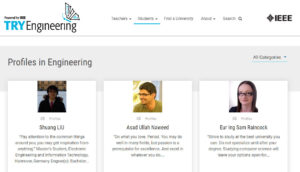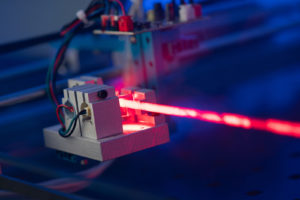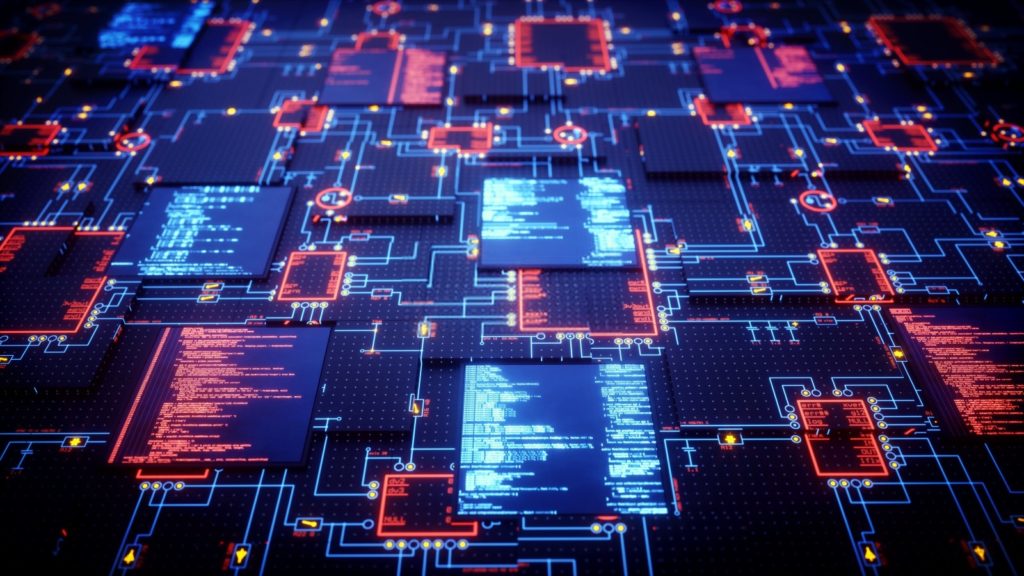TRYENGINEERING CAREER PATHWAYS
Electrical Engineering
Electrical and electronics engineers conduct research, and design, develop, test, and oversee the development of electronic systems and the manufacture of electrical and electronic equipment and devices. From the global positioning system that can continuously provide the location of a vehicle to giant electric power generators, electrical and electronics engineers are responsible for a wide range of technologies.
Some of this equipment includes electric motors; machinery controls, lighting, and wiring in buildings; radar and navigation systems; communications systems; and power generation, control, and transmission devices used by electric utilities. Electrical engineers also design the electrical systems of automobiles and aircraft.
What makes it unique?
Electrical engineers are involved in most industries and are integral to the development of most products and systems that impact our lives.
 Degree Connections
Degree Connections
The following are examples of some accredited degrees leading to a career in electrical engineering:
- Electrical Engineering
- Electrical Engineering Technology
- Electronics Engineering
- Electronics Engineering Technology
- Electromechanical Engineering
- Photonics
- Computer Engineering
Search our global database of accredited engineering programs.
Want to learn more?
Click on the blue tabs to explore the field in more detail and learn about preparation and employment, the green tabs to be inspired by people working in electrical engineering and how they impact the world, and the orange tabs for ideas on how to learn more and you can get involved with activities, camps, and competitions!
Explore
A Day in the Life

Many electrical and electronics engineers specialize in a branch, such as controls systems, and in an application area, such as medical, computer, or power distribution. These areas of concentration often impact what an average day might look like. In general, electrical engineers will work in offices and work regular work hours, but they also might visit a manufacturing facility or a hospital to test or research products during development, and could be called upon to put in longer hours when a product is in a critical development or testing phase.
They will likely be working collaboratively with other engineers as they solve problems or develop new products or processes. Because electrical engineering is required for the development of most new or redesigned products, they often will be considering the efficient designs for the next phone, a new satellite, a car dashboard, a power strip, or even an improved light bulb!
Electrical engineers:
- design, develop, test, and supervise the manufacture of electrical equipment and electrical systems for automobiles and aircraft including:
- electric motors;
- machinery controls,
- lighting, and wiring in buildings;
- radar and navigation systems;
- communications systems; and
- power generation, control, and transmission devices used by electric utilities.
- focus on the generation and supply of power
- specialize in areas such as
- power systems engineering or
- electrical equipment manufacturing
- design, develop, test, and supervise the manufacture of electrical equipment and electrical systems for automobiles and aircraft including:
Historical Snapshot
The Light Bulb
Thomas Edison is perhaps the most famous of all electrical engineers even though at the time engineering has no official “electrical engineering” designation. His contributions to modern life are extensive, with inventions that all incorporate electrical engineering principles.
While others had laid the groundwork for artificial light and had been working on the idea for many years, he hit on the right combination of a carbon filament design and so was the first to solve the practical and commercial challenges of light bulb development…changing our world. The video to the right explores the interesting history of electric lighting and how it has changed over the years.
Now LEDs have taken over the lighting market and this energy efficient technological change resulted from the hard work of electrical engineers and others.
Explore more:
- Lewis H. Latimer, Electrical Pioneer and Inventor, the only African American “Edison Pioneer”
- Edison, “The Wizard of Menlo Park’s” Electric Light
- LED: Light Emitting Diode
Industries and Employment
Electrical Engineers are employed globally and work in just about every industry! As examples of the range, IEEE Technical Communities cover a wide range of interests from cloud computing, to cybersecurity, to digital reality, to smart cities, to transportation electrification. And technical interests are just as broad, as represented by IEEE Societies, with examples including robotics, automation, power, ultrasonics, cybernetics, broadcasting, aerospace, and electromagnetics! Most electrical engineers identify an area of interest which points their career to one industry or another.

bigstock.com/Denis Rozhnovsky
Almost every company employs electrical engineers, but beyond the more obvious employers, electrical engineers are contracted to consult on legal matters, contribute to the educational system, advise investment advisors, and of course support government initiatives.
The following is just a sample of some industries, so you can explore the type of projects worked on globally:
- Aerospace
- Appliance Manufacturing
- Automotive
- Consumer Products
- Financial Institutions
- Government
- Manufacturing
- Medical Equipment
- Sensor Manufacturing
- Telecommunications
- Transportation
Preparation and Degrees
For most engineering careers:
- a bachelor’s degree is required
- a master’s degree may be recommended for those specializing or interested in management
- students may also start with a related associate degree and then move on to a bachelor’s when they have settled on a degree path.
- many students are required to participate in a co-op program while at university to gain real world experience in their chosen field.
- education doesn’t really stop…engineers need to stay current as technology changes and materials and processes improve over time.
- many professional societies offer certificates and coursework to support continuing education for their members.
It is important to select an engineering degree that has been accredited to meet basic standards. Find out more and browse TryEngineering’s global database of accredited engineering and computing programs.
Electrical engineering students will take a range of courses on topics such as circuits, electronics, digital design, and microprocessors. Laboratory courses play an important role in reinforcing the concepts learned in the lecture courses. The core curriculum builds on a foundation of basic courses in calculus, physics, chemistry, and the humanities. Concentration courses vary with the engineering school, but generally offer studies in such topics as communications systems, power systems, and control and instrumentation, all with associated laboratory work. Some universities will also offer concentrations in medical instrumentation or in microwave or optical systems.
Be Inspired
Amazing Engineers!
 One of the best ways to explore what it might be like to work in electrical engineering is to learn about people who made broad contributions to electrical engineering as well as those who currently work in the field.
One of the best ways to explore what it might be like to work in electrical engineering is to learn about people who made broad contributions to electrical engineering as well as those who currently work in the field.- IEEE provides interviews with many electrical engineers through their Meet an Engineer program…find out about the career paths of many EEs!
- Historically, one of the most famous electrical engineers is Nikola Tesla was a Serbian American inventor, electrical engineer, mechanical engineer, physicist, and futurist best known for his contributions to the design of the modern alternating current, AC, electricity supply system.
- Bertha Lamme was a Westinghouse employee and the first woman to earn an electrical engineering degree.
- Guglielmo Marconi was an Italian inventor and electrical engineer, known for his pioneering work on long-distance radio transmission and for his development of Marconi’s law.
Global Impact: Photonics
 Photonics really began with the invention of the laser in 1960 (think about how CD and DVD players work, and how lasers are used in manufacturing), but more inventions followed including the laser diode in the 1970s, optical fibers for transmitting information, and erbium-doped fiber amplifiers. These contributions helped launch the telecommunications industry and contributed to the needed infrastructure for the Internet. The impact globally of the internet is hard to quantify! Without the internet, access to educational and medical resources would be less available in regions of the world which are relatively isolated.
Photonics really began with the invention of the laser in 1960 (think about how CD and DVD players work, and how lasers are used in manufacturing), but more inventions followed including the laser diode in the 1970s, optical fibers for transmitting information, and erbium-doped fiber amplifiers. These contributions helped launch the telecommunications industry and contributed to the needed infrastructure for the Internet. The impact globally of the internet is hard to quantify! Without the internet, access to educational and medical resources would be less available in regions of the world which are relatively isolated.While electronics involves the control of electrons, photonics deals with the control of photons in terms of generating and harnessing light and other forms of radiant energy. Photonics impacts energy generation and detection, communications, information processing and other applications and is a growing field within electrical engineering. As examples, tablets and smartphones are the result of photonics and optics research. Many engineers are currently conducting research in quantum optoelectronics, and ultrafast optical science – helping to develop tomorrow’s devices!
Find out more:
Get Involved
Keep Learning
Dig deeper into topics related to electrical engineering that interest you!
Explore:
- TryEngineering Summer Institute: What is Electrical Engineering?
- TryEngineering News Blog
Watch:
- Columbia Engineering: What is Electrical Engineering?
- University College London: What is Electrical Engineering?
Try it Out:
- Play some games that involve electrical engineering! (placeholder)
- Try one of the TryEngineering lessons that focus on bioengineering:
Competitions and Events
Clubs, competitions, and camps are some of the best ways to explore a career path and put your skills to the test in a friendly-competitive environment.
Clubs:
- Some pre-university schools will have electronics clubs or programs which help students master electrical basics before beginning a degree. See what your local school offers!
- At the university level, professional organizations often have student chapters with events and competitions. An example is IEEE Students.
Competitions:
- Autonomous Snowplow Competition challenges university students to design, build, and operate a fully autonomous snowplow to remove snow from a designated path.
- IEEE Circuits and Systems Society Student Design Competition is a worldwide competition where undergraduate students suggest and execute projects in Electrical Engineering and related areas.
Camps:
- TryEngineering Summer Institute: Attend the IEEE TryEngineering Summer Institute to further your core engineering skills.
- Women’s Technology Program (WTP) is a four-week summer academic and residential experience where 60 female high school students explore Electrical Engineering and Computer Science (EECS).
Many universities offer summer engineering experiences. Reach out to your local university’s engineering department to see what they offer.
Local Connections

bigstock.com/ Kamrad
Did you know you can explore electrical engineering in your community? Do you have a local radio or TV station? Consider the transmission of radio signals from that station:
- How does radio work?
- What role do broadcasting towers in your area play in the transmission of radio or TV signals?
- What is the difference between AM and FM radio in terms of transmission?
- How does satellite radio work?
- What social impact do you think that radio had when it was first introduced?
Find out more:
Groups and Associations
Be sure to reach out to professional societies focused on engineering where you live. Not all will offer membership to pre-university students, but most offer groups for university students, and certainly offer online resources to help you explore the field. Some examples of groups focusing on electrical engineering:
Some resources on this page are provided or adapted from the US Bureau of Labor Statistics and the Career Cornerstone Center.



